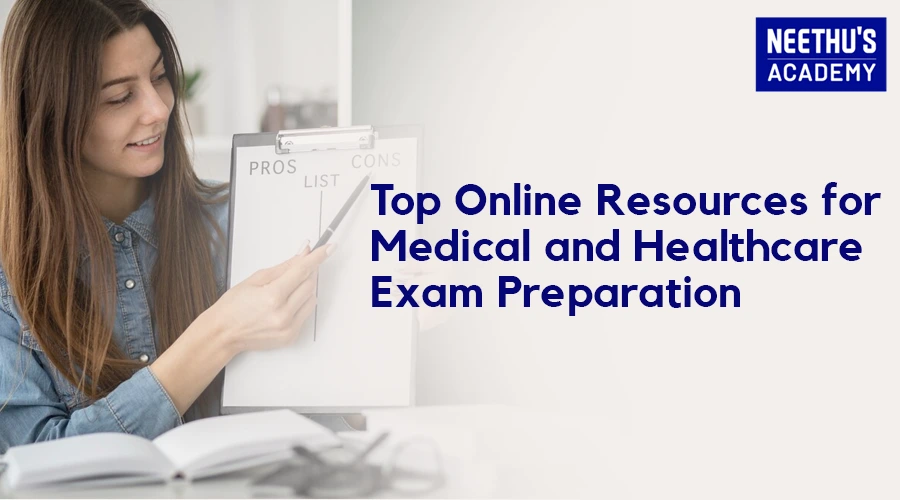Study Habits for Healthcare Exams: Techniques and Exam Strategies
Good effort and smart strategic study habits are necessary to prepare for healthcare exams. Compared to ordinary exams, healthcare exams are very challenging. To begin with, they span vast content and require ample application-based questions that test theories and critical thinking abilities. Good study habits would thus help master all the material, keep one organized, and reduce all the stress involved in the preparation process.
There can be a huge amount of data, coupled with its complexity, so studies for healthcare exams can be quite daunting. But the right study skills can tell a lot, distinguishing between merely passing and passing well. There are skills such as active recall and spaced repetition, practice scenarios, and group studies with peers. And yes, the right techniques do improve retention, comprehension, and test-day performance.
In this study guide, we will cover proven techniques to build a framework to help healthcare students perform their best. We will cover almost everything from making a study plan to formulating a study group and becoming immersed in practical case scenarios. Whether studying for a medical, nursing, or allied health exam, these strategies will set you on your way to success.
Importance of Effective Study Habits for Healthcare Exams
Why Good Study Habits Are Important in Passing Healthcare Exams
Sound learning habits for healthcare exams are essential because they are most important for allowing people to hold onto memory effectively and to apply knowledge. Students in healthcare require a basic understanding and application of theory-based concepts applied quickly in decision-making scenarios. Good learning habits can lead to long retention of information and a good foundation for critical thinking, which benefits students’ success at careers in the health professions.
For example, you can employ active recall by using flashcards to memorize complicated terms about medicine and treatment protocols. Practice cases train you to analyze situations and apply your theoretical knowledge in practically tense settings. If a student lacks these skills, the chances are that it will even hinder their ability to recall information when required under pressure-professionally speaking.
Some of the Main Challenges Health Students Face While Preparing for Exams
Healthcare students face some peculiar challenges when preparing for exams, these include:
Information: It is very vast, and so there is a lot that cannot be covered without a proper study schedule.
Interrelated: Concepts are always interlinked in healthcare topics and one concept hardly exists without learning about others.
High Pass Marks: Healthcare exams are never so lightly passed because the pass marks will be pretty high.
Applications: Mostly case-based or application-based questions are used in the exams rather than just memorizing facts.
A strong study habit helps students overcome some of these problems effectively and remember what they have read, understand complex topics, and score well.
Top Study Habits for Healthcare Exams
Plan an in-depth study plan
The backbone of preparing for any exam is a study plan. From here, you need to break down the broad areas into which you are supposed to cover the topics and based on the date of your exams, create daily, weekly, and monthly goals, then allocate blocks of time to particular areas of study.
For example, you may dedicate Mondays and Wednesdays to anatomy and Tuesdays and Thursdays to pharmacology. That way, you will work through the topics each day, keeping you organized and reducing your stress levels significantly as the exam date draws closer. Add periodical review periods to try and reinforce what you have learned.
Use Active Recall and Spaced Repetition
Active recall and spaced repetition are scientifically supported ways in which the information is retained. Rather than reading over your notes passively, actively test yourself on the material. Flashcards, especially homemade ones, are an easy and effective means to practice active recall. Anki, or similar tools, can also help automate spaced repetition, reviewing information with you at appropriate intervals to solidify long-term memory.
For example, when you are learning about cardiovascular diseases, take the symptoms, causes, and treatments and make flashcards. Keep reviewing yourself regularly and the time between reviews should coincide with your level of confidence in each card. It is a simple tool that has the chance to drive knowledge into the unconscious mind for retrieval on examination day.
Case-Based Practice
Case-based scenarios are a norm of health care exams; they test the application of theoretical knowledge in practical contexts. Case-based practice prepares one for questions likely to appear in the exam and helps develop a mindset of critical thinking.
For instance, once you have been taught the respiratory system, identify or develop case studies of patients suffering from respiratory disorders such as asthma or COPD. Imagine how you would diagnose and treat them and report the symptoms, the process of diagnosis, and the possible treatment.
This also helps in preparing for clinical practice through the consolidation of diagnostic reasoning.
Teach What You’ve Learned
Teaching is arguably the best way to consolidate knowledge. By explaining concepts to a friend, family member, or study group, teaching forces you to articulate what you have learned and identification of any points of weakness. This process also helps you remember tough facts, since to explain it clearly, you need to know the material inside and out.
For example, you can start with summarizing after addressing a topic. Verbalize it as if you were lecturing to a class. If there are some topics that seem difficult to verbalize, go back to your materials and review the matter until you really get it down.
Ensure Regular Breaks and Self-Relaxation
Preparing for healthcare exams may be very intensive and will surely burn out if there are no real breaks. Try to include several short breaks in your study sessions and allow time for physical activity, hobbies, or relaxation. These relieve your mind and improve concentration while preventing study fatigue.
For example, in the Pomodoro technique, one studies in periods of 25 minutes followed by a five-minute break. Additional breaks such as a 15 to 30-minute break after every two hours can further increase productivity and look after mental health.
Essential Study Techniques for Healthcare Professionals
Use diagrams and illustrations
Some topics are impossible to comprehend without diagrams and illustrations. Create flowcharts, mind maps, or diagrams for topics that involve a series of steps in your understanding, such as how the heart works or biochemical pathways.
For example, while learning pharmacology, make a flowchart that expresses classes of drugs, mechanisms, and side effects. One is in a better position to learn better when visual information is applied because it is easier to understand, hence greatly helpful for the students of visual learning, who are likely to remember more and recall it clearly while under exams.
Read and do practice questions simultaneously
Reading will make you understand concepts, but practice questions connect theory with practice. After reading the chapter, try solving the questions regarding that topic for testing yourself. Practice questions will help create an exam environment, and you will be able to determine how prepared you are and which areas still need work.
There is one very popular method, “read-review-repeat”. You read the material, review the key concepts, and then solve practice questions. Keep repeating this cycle until you feel confident about what you’re learning.
Use Online Resources and Study Apps
There are online resources and study apps available to assist the healthcare student with video tutorials, practice questions, flashcards, and so much more. Websites like Medscape and UpToDate share in-depth medical material and apps like Anki and Complete Anatomy provide interactive learning tool.
For example, Osmosis provides an extensive video and quiz bank on healthcare topics and allows you to create your flashcards for a Quizlet. These are particularly convenient because you can study from anywhere and whenever.
How Professional Coaching and Peer Study Groups Can Enhance Preparation
Advantages of Joining a Peer Study Group
Peer study groups are a friendly environment where challenging topics can be discussed in order to test each other and appreciate viewpoints they have not seen. Group influence can remind you of your learning and facilitate teamwork by solving problems.
For example, after studying a subject, discuss case scenarios from your group. Each member might contribute insights that can actually be of deeper and better understanding of the material.
Advantages of Professional Coaching toward Healthcare Exams
Professional coaching gives you one-on-one attention, good quality material, and a plan on what to study and when. Coaches may also be able to identify your strengths and weaknesses, make a tailored approach for planning your time, and strategies on how to take the test. Such professional guidance will help in more effective preparation so that you pass the difficult healthcare exams with ease.
Conclusion
Moving forward into health care exams requires more than cramming; they require strategies that help improve memorization, comprehension, retention, and application. You can use these study habits to come up with a systematic plan of study and utilize peer study groups, professional coaching, and other resources to help you best prepare for the healthcare exam. Hard work, regular practice, and effective strategies help you acquire success in healthcare exams.
Frequently Asked Questions





